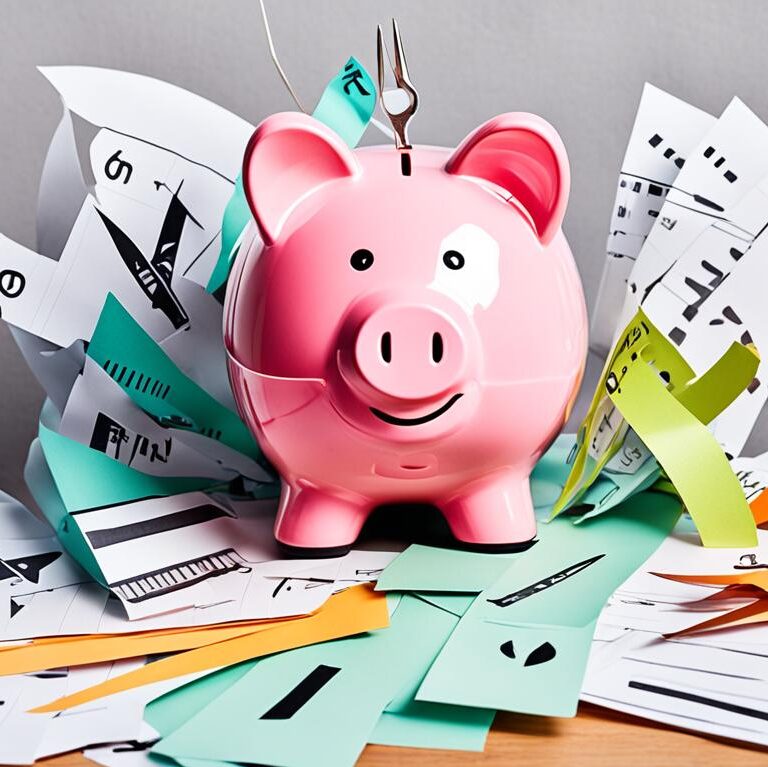“As an Amazon Associate I earn from qualifying purchases.”
We all feel the stress of financial uncertainty at times. The memories of job losses and watching investments fall during a tough economic period can be overwhelming. It’s difficult seeing the stability we worked hard for start to fall apart. Fear of recession is always hanging around, making us worry about our dreams and goals.
In 2008, markets crashed and many families faced tough times. That’s why we look for investments that can stand strong during a recession. We’ve been on edge for a recession since the yield curve flipped in July 2022. While it hasn’t happened yet, history shows us that recessions are bound to occur. They typically happen every five to ten years, leaving markets weak and people losing confidence.
Bonds are like a safe haven for investors when things get shaky. The Federal Reserve cutting rates usually means bond prices go up, so they’re a good choice during recessions. Gold is another solid investment, shining bright when the economy is down. It has had positive returns in most downturns since 1993.
Getting through a recession isn’t just about choosing the right investments. It’s also about making smart moves to stay strong. There are many ways to do this, from improving your job skills to smart budgeting. For more tips on handling recessions and staying strong, check out this resource.
Let’s talk about the best investments for keeping your money safe during a recession. It’s about preparing now for a stable financial future. This way, we won’t be left struggling when the next economic downturn hits.
Key Takeaways
- Recessions happen every 5-10 years as part of the economic cycle.
- Bonds are great assets during downturns, thanks to Federal Reserve rate cuts.
- Gold is a strong investment, with positive results in most recessions since 1993.
- Choosing investments wisely can protect your money during tough times.
- It’s important to manage your money well and have a plan when the economy is down.
Understanding Economic Cycles and Recessions
Economic cycles include expansion and contraction periods. Recessions, marked by declining GDP for two quarters, are key to these cycles. Understanding recessions helps in making smart financial and investment choices.
Definition and Causes of Recessions
Many factors can trigger a recession. This includes inflation, less spending by people, and political issues. A recession usually brings lower confidence, job losses, reduced incomes, and fewer sales and production. The National Bureau of Economic Research looks at income, employment, and other data to identify recessions.
Historical Perspective on Recessions
Recessions tend to happen every five to ten years. For example, during the global financial crisis, stocks annually lost 24% from late 2007 to mid-2009. Most recessions since the Great Depression saw value stocks perform poorly. Yet, certain assets like gold and U.S. government bonds often gained value during recessions. On average, the S&P 500 has dropped 32% during recession-related downturns, showing how deeply economy cycles affect investments.
Predicting and Navigating Economic Downturns
It’s hard to predict recessions accurately. Economist Paul Samuelson once joked that the stock market predicted more recessions than actually happened. One sign of a coming recession can be an inverted yield curve. Also, during recovery, bond spreads often shrink. Knowing these signs helps investors manage downturns better by choosing the right assets.
In recessions, bonds and large-cap stocks usually do better than riskier investments. The consumer staples sector often does well, offering a safer investment option. Companies that are large, profitable, and have strong cash flows can protect investors during tough times.
Why Safe Investments Matter During Recessions
During economic downturns, it’s important to protect your money. Safe investments help reduce the negative impact of recessions. By choosing where to put their money wisely, investors can keep their wealth safe during tough. This move ensures they’re financially secure. Now, let’s look at why safe investments are so important. They focus on keeping your capital safe, reducing risks, and ensuring you still have money coming in.
Preservation of Capital
Keeping your money safe is the main goal during a recession. Safe investments like government bonds and top-tier fixed incomes are key. From 1973 to 2009, the U.S. saw six recessions. Each showed the importance of reliable investments. Treasury and mortgage-backed securities are among the safest options. They provide a safe place for your money in bad times.
Minimizing Risks
Cutting down on investment risks is crucial for recession-proof strategies. Some industries, like utilities, healthcare, and basic goods, are less affected by downturns. For example, while businesses in non-essential goods may struggle, grocery and discount stores, funeral services, and utilities usually remain solid. This helps in lowering investment risks. Having a mix of investments, like ETFs and index funds, also spreads out risks. This makes them safer bets when the economy is uncertain.
Stabilizing Income Streams
Having a steady income during a recession is essential. It helps keep you financially stable. Stocks and bonds that pay dividends or interest can create this stable income. Reliable companies and government bonds offer protection against market ups and downs. Many investors switch to bond funds in tough times for safer returns. Focusing on investments with regular payouts can help keep your finances in check during recessions.
In conclusion, smart investment choices during recessions are key to keeping your money safe, cutting down on risks, and ensuring a stable income. To learn more about thriving during economic downturns, click here.
Investing in Bonds During Recessions
When the economy goes down, many investors turn to bonds. They look for stability and consistent gains from them. Bonds are a top choice in recessions. They can gain value when market chaos rises and interest rates drop.
Why Bonds Are Safe Haven Investments
Bonds offer steady money and are usually less shaky than stocks. In recessions, bonds often do well in the early stages. They outperform stocks and high-yield bonds. Treasury bonds are the safest. They are backed by the U.S. government, and the risk of losing money is almost zero.
Types of Bonds to Consider
Investors can choose from different bonds based on their needs and how much risk they can handle:
- Treasury Bonds: The U.S. government backs these, making them very safe.
- Municipal Bonds: Local governments issue these. They don’t tax the interest you earn.
- Corporate Bonds: Companies issue these. They pay more but have a higher risk.
- High-Yield Bonds: Known as junk bonds, they offer high returns but are riskier.
By picking a mix of these bonds, you can lower risks and do well in a recession.
Historical Performance of Bonds in Recessions
Through history, bonds usually do well when the economy is bad. Core bonds bring stability by performing well early in a recession. High-yield bonds and stocks may improve later in a recession. I bonds, for example, offer protection against inflation. Their rates can go as high as 9.62% or adjust to 4.28% through October 2024.
Treasurys, corporate, and municipal bonds offer steady interest. This is key for keeping cash flow when times are tough. Yet, risks like rising interest rates and defaults can impact values. To lessen the hit of a recession, it’s wise to spread out your investments. Stick to your long-term goals.
Gold as a Recession-Proof Investment
Investing in gold has shown to be wise during economic challenges. It offers a stable shield against market uncertainties and inflation. Gold and precious metals are attractive during tough times for cautious investors.
The Role of Precious Metals in Economic Downturns
In recessions, many investors choose precious metals like gold. They do this because of their solid history and value. When stock and bond markets are unpredictable, precious metals are a safe choice. They are important in a well-rounded investment plan.

Performance of Gold in Past Recessions
In the past, gold has done well in recessions. For example, in 1973 and 1974, the stock market fell by a lot. But, the price of gold went up by 73.49% and 67.04%. This shows gold can protect or grow your money when other investments fall.
Similar patterns were seen in the 2002 and 2008 recessions. Even when other assets lost value, gold investments either kept their worth or became more valuable.
| Year | Stock Market Decline | Gold Price Increase |
|---|---|---|
| 1973 | -17.37% | +73.49% |
| 1974 | -29.72% | +67.04% |
| 2002 | N/A | Performance observed |
| 2008 | N/A | Performance observed |
How to Invest in Gold
There are many ways to start investing in gold. You can buy physical gold like coins or bars. Or, you can invest in gold ETFs such as SPDR Gold Trust (GLD) for easier access. Another option is to put money into mining stocks, like Newmont Corporation, or mutual funds that focus on precious metals. Each method has its own risks and returns. It’s about finding what works for your investment goals.
Health Care and Consumer Staples Stocks
Some sectors stay strong even when the economy is weak. Health care stocks and consumer staples are good examples. They keep doing well because people always need them. Let’s explore why these areas are great choices during tough times and look at some leading companies.
Why These Sectors Perform Well in Recessions
Health care and consumer staples are always in demand, even in a bad economy. This makes them safe options for investors looking for stability. Things like medical care and everyday goods keep these sectors steady. So, investing here during recessions can be smart.
Health care is crucial because people need medical services no matter what. Consumer staples cover basic household needs that don’t go away. This is why these sectors are strong when times are tough.
Examples of Strong Companies in These Sectors
Some companies are known for their reliability. In health care, firms like Johnson & Johnson, CVS Health, Pfizer, and UnitedHealth Group stand out. Medtronic is also doing well in the medical devices area.
In consumer staples, Kroger and PepsiCo do well in groceries and drinks. Companies such as Procter & Gamble and General Mills are in demand for household and food products. Affordable stores like Walmart and Dollar General attract budget-conscious shoppers, making them great during downturns.
Historical Performance of Health Care and Consumer Staples
History shows us that health care and consumer staples do well in tough times. They have been strong during past recessions. Health care benefits from ongoing need for medical services. Consumer staples grow as people focus on essential items. This was clear in the 2008 crisis and the recent COVID-19 recession.
Companies like Johnson & Johnson and Procter & Gamble remain stable through hard times. Their success highlights the importance of investing in essential sectors. These sectors provide a steady base during economic instability.
Large-Cap Stocks for Financial Security During a Recession
During a recession, people often turn to large-cap stocks. These are seen as safe options. They belong to big companies valued at over $10 billion. This makes them stable investments in shaky economic times.

Characteristics of Resilient Large-Cap Companies
Resilient large-cap stocks share certain features. They have strong financial foundations, operate in various domains, and make consistent profits. For example, Walmart has steady cash flows and the power to keep prices stable. This allows it to keep running or even grow during recessions.
Examples of Recession-Resistant Large-Cap Stocks
Some large-cap stocks do well even when the economy doesn’t. Sectors like healthcare and consumer staples are often resilient. Brands like Johnson & Johnson and Procter & Gamble meet basic needs, ensuring people keep buying their products. Below is a comparison of such investments:
| Company | Sector | Recession Performance |
|---|---|---|
| Walmart | Consumer Staples | Stable Revenue and Positive Cash Flow |
| Johnson & Johnson | Healthcare | Consistent Growth and Profitability |
| Procter & Gamble | Consumer Staples | Robust Market Position and Demand Stability |
Choosing recession-resistant stocks can reduce your risk. These assets aim for long-term security. By investing in large-cap stocks that stay strong in downturns, you can face economic challenges better.
Best Assets to Own During a Recession
Choosing the right assets during a recession is key. Safe investments can keep your finances stable or even help them grow in tough times. For instance, treasury securities are stable, more so when the Fed hikes interest rates to fight inflation, like in the recent 18 months.
Gold is also a strong choice during downturns. It surged up to 73% in past recessions, while stocks often fell hard. Adding sector-specific ETFs and stocks in necessary areas like health care or consumer staples to your portfolio is smart, too. These sectors tend to hold up well, making them good picks.
Stocks in consumer staples and utilities are usually safer. But, don’t overlook real estate, especially when interest rates drop after a recession. According to recession survival experts, a mix of diverse assets can protect against market ups and downs. A strong plan mixes sector funds, big company stocks, and key commodity stocks for less risk.
For a structured look, here’s how some investments stack up during and after recessions:
| Asset | Performance During Recession | Post-Recession Outlook |
|---|---|---|
| Gold | High | Moderate |
| Consumer Staples Stocks | Stable | Stable |
| Treasury Securities | Stable | Low |
| Real Estate | Low | High |
| Small-Cap Stocks | Poor | High |
Each asset has a role in a smart investment plan. Mixing gold, treasury securities, and sector stocks can protect your money. It might also let you grow it even when the economy is down.
Investing in Fixed-Income and Dividend-Yielding Investments
Many investors turn to fixed-income investments and dividend-yielding stocks during tough times. These options are key to keeping a stable income during downturns. Since 1948, the U.S. has seen 12 recessions, happening roughly every six years. They typically last about 11 months, showing why strong investment tactics are crucial.
Benefits of Fixed-Income Investments
Bonds are perfect for those wanting to guard their funds while earning regular income. In downturns, shifting to federal bond funds, municipal bond funds, or corporate bonds is smart. This move provides stability and predictable income.
Fixed-income investments mean getting interest payments regularly. You can use this money or put it back into your investments when the market is uncertain. These choices lessen the danger of basing decisions on market fluctuations.
Switching your investment to cash after the market drops by 20% might lower your returns a lot. Having a varied investment mix with a solid portfolio is the best plan for the long haul. Check out this Investopedia article for more insights.
Top Recession-Proof Dividend Stocks
Dividend-yielding stocks are vital for a strong portfolio during downturns. They ensure a stable income during downturns with regular dividend payments. You can take this as income or reinvest it. Firms like Johnson & Johnson, Procter & Gamble, and Coca-Cola have a good record of paying and raising dividends. This usually means they’re well-run.
Putting money into sectors such as utilities, consumer staples, and healthcare is wise. These areas tend to be more stable. Dividend stocks in these fields are often seen as safer during bad economic times. They offer a chance for your investment to grow and give stable income.
| Investment Type | Pros | Cons |
|---|---|---|
| Federal Bond Funds | Low risk, stable returns | Lower growth potential |
| Municipal Bond Funds | Tax advantages, steady income | Interest rate sensitivity |
| Taxable Corporate Bonds | Higher yield potential | Credit risk |
| Dividend-Yielding Stocks | Regular income, potential growth | Market risk |
Investing in fixed-income and dividend-yielding stocks is smart during downturns. This strategy helps keep your capital safe and gives a reliable income. It makes your financial portfolio more stable.
The Role of Cash and Emergency Funds
During hard times, having cash on hand is key to getting by. Keeping cash and a well-planned emergency fund are vital. They form a strong financial plan.
Importance of Having Cash Reserves
Many Americans are not ready for financial surprises. A Bankrate survey found that about 60% think they don’t have enough saved up. 27% don’t have any emergency savings, the most since 2020. This shows how crucial it is to have cash ready for tough times.
Creating and Managing an Emergency Fund
An emergency fund is your backup for unforeseen costs. It keeps you from touching long-term savings. Experts say save up to six months’ living expenses. For single earners, it’s suggested to save more. This money should be in safe, easy-to-get-to investments.
“Maintaining an emergency fund helps avoid cashing in investments when the market is down,” say many experts. It’s key for keeping your finances solid.
High-Yield Savings Accounts and Other Cash Options
High-yield savings accounts are great for your emergency fund. They grow your savings safely and are usually insured. With rising interest rates, they also help beat inflation.
Retirees should keep a year’s expenses in cash. Entrepreneurs and small business owners need 8-12 months’ expenses saved. This helps them during slow business times.
To handle a recession, you need a smart cash plan. Focus on your emergency fund and choose high-yield savings. This way, you can face downturns better and be ready for chances later.
Sector-Specific Funds and ETFs
Investing in sector-specific ETFs can help you build a strong portfolio. These funds let you focus on industries that often do well in hard times. This can add an extra layer of safety.
Advantages of Diversification
Sector-specific ETFs spread your risk across many companies within a sector. This diversification during downturns can soften the blow of one company’s poor performance. By picking sectors like healthcare, consumer staples, and utilities, your portfolio can be tougher.
Sectors to Focus On During Recessions
Some sectors are known for holding up well during recessions. For example, Regeneron Pharmaceuticals Inc. (REGN) in the healthcare sector saw a 30.04% gain in Q1 2020. The Clorox Co. (CLX) from the consumer staples sector had a 13.60% return, proving essential goods are always in demand. Utilities also offer high dividends, making them a strong choice during tough times.
Popular Sector ETFs for Recession Investing
Putting your money in popular sector ETFs is a smart way to protect your investments. In the tech sector, companies like Citrix Systems Inc. (CTXS), NortonLifeLock Inc. (NLOK), and NVIDIA Corp. (NVDA) had strong returns in Q1 2020. In real estate, Digital Realty Trust Inc. (DLR) and SBA Communications Corp (SBAC) also showed impressive gains.
| Sector | Key Companies | Q1 2020 Returns |
|---|---|---|
| Healthcare | Regeneron Pharmaceuticals Inc. (REGN) | 30.04% |
| Information Technology | Citrix Systems Inc. (CTXS), NortonLifeLock Inc. (NLOK), NVIDIA Corp. (NVDA) | 12.10% to 28.02% |
| Real Estate | Digital Realty Trust Inc. (DLR), SBA Communications Corp (SBAC) | 12.22% to 17.02% |
| Consumer Staples | The Clorox Co. (CLX) | 13.60% |
| Communication Services | Netflix Inc. (NFLX) | 16.05% |
Conclusion
Preparing for economic downturns means being ahead with your investments. A mix of bonds, gold, and specific stocks keeps your money stable when the market shakes. History tells us bonds often gain during tough times, across eight recessions.
On the other hand, stocks can react differently. For example, in the 1980s recessions, they actually went up, just like high-quality bonds did.
If you want to make your portfolio even stronger, think about adding investments that pay dividends. Look at stocks in health care and consumer staples. They bring steady income and tend to do well even when other stocks don’t. Dollar-cost averaging is another smart move. It smooths out the risk of market ups and downs.
Keeping some cash on hand is also wise, whether in high-yield savings or fixed income options. When the Fed cuts interest rates during downturns, bond prices usually go up. This makes them a key part of a diverse investment mix. As the economic climate in 2023 stays strong despite inflation and high interest rates, it’s crucial to keep up with our investment plans.
By keeping up with these strategies, we not only protect our assets but also set ourselves up for future success. When the market recovers, we’ll be ready to grow.
FAQ
What are some recession-proof investments?
How often do recessions occur, and what causes them?
Why is it important to focus on safe investments during a recession?
Why are bonds considered good assets to own during a recession?
How has gold historically performed during recessions?
Which sectors typically perform well during recessions?
What are the characteristics of resilient large-cap stocks during a recession?
What are the best assets to own during a recession?
What are the benefits of fixed-income and dividend-yielding investments during a recession?
Why is it important to have cash reserves during a recession?
How do sector-specific funds and ETFs help during recessions?
“As an Amazon Associate I earn from qualifying purchases.”

